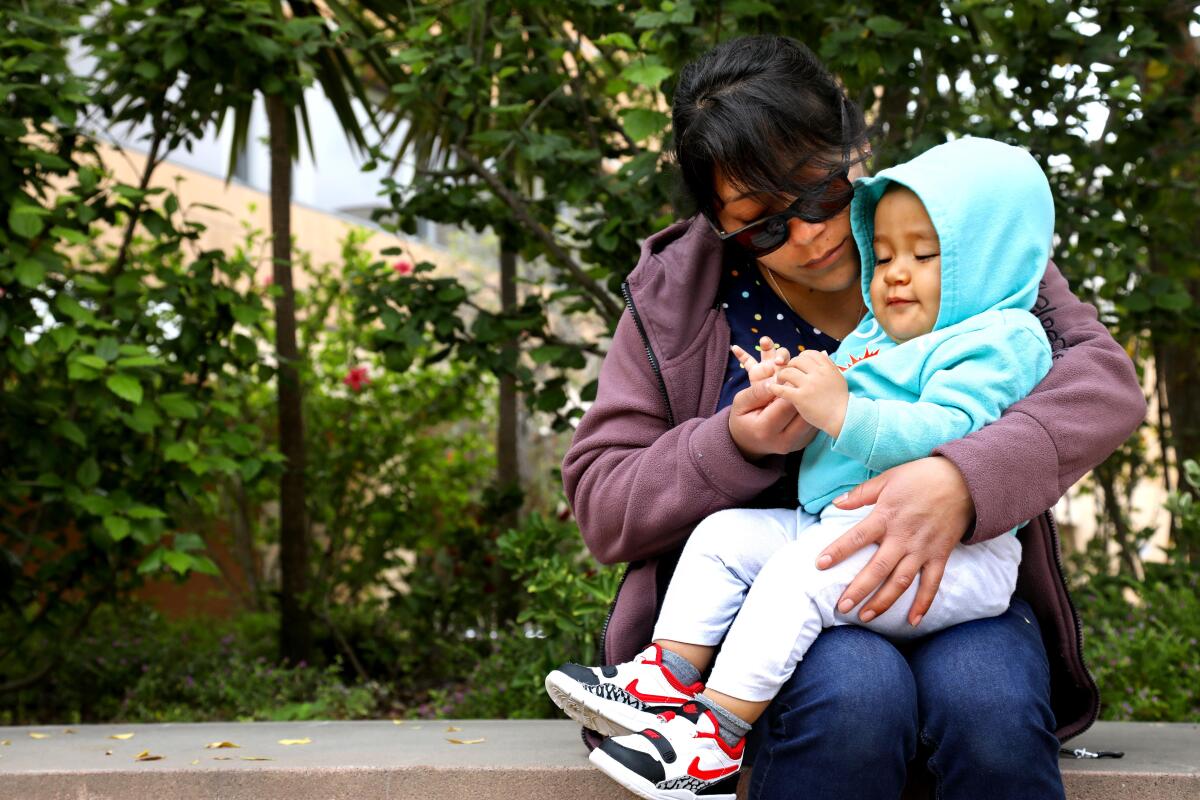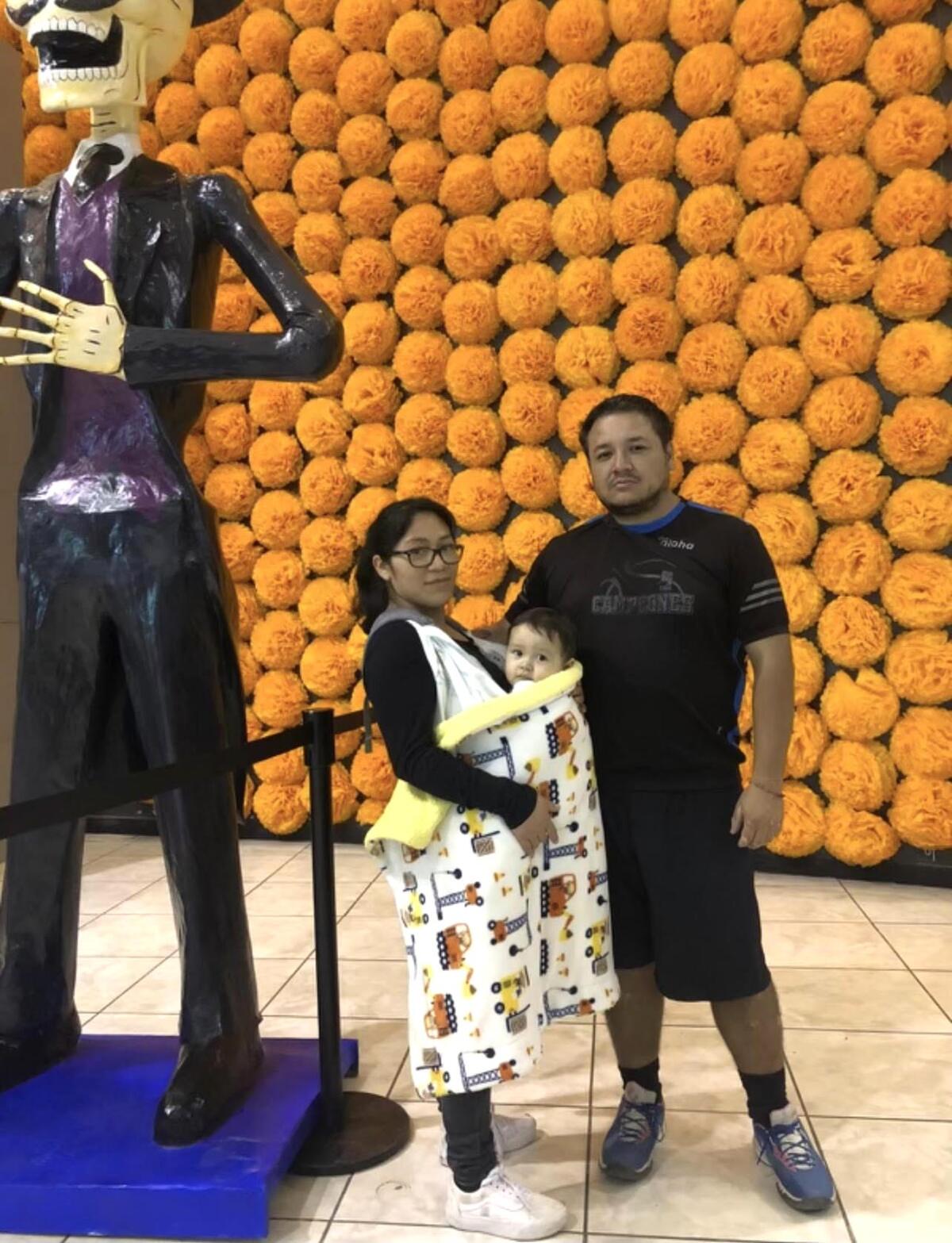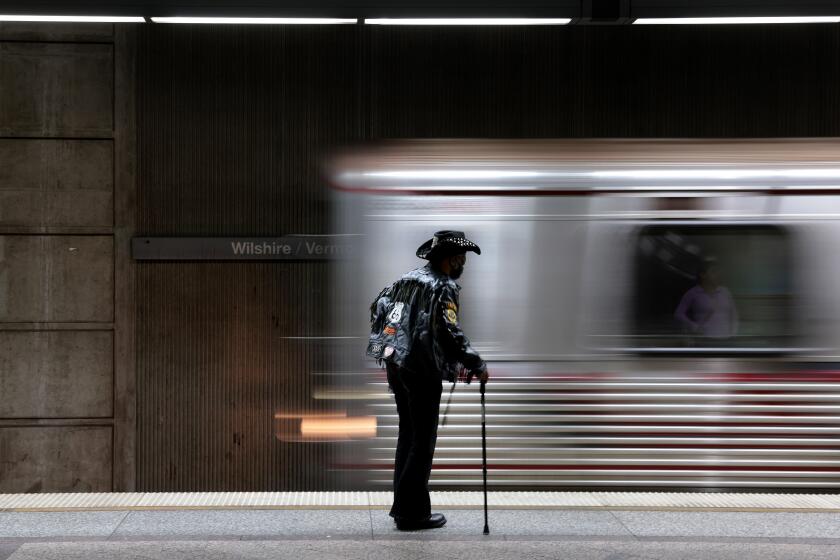He came to L.A. 3 months ago with his young family. A ride on a Metro bus led to his death

The last message Sarahi Varela Lopez received from her husband, he was heading home from work Thursday afternoon.
The couple and their 1-year-old son had come to Los Angeles a few months earlier on vacation, but running low on funds and wanting to stay longer, Juan Luis Gomez Ramirez found a job packing clothes at a Commerce warehouse.
It normally took him 35 minutes on two buses to return home to his brother-in-law’s house in East Los Angeles. But he never showed up.
About 13 minutes after he sent the message, the Los Angeles County Sheriff’s Department responded to a call of shots fired on a Metro bus, Line 108, along the 6200 block of Slauson Avenue, two stops away from his work. When Gomez Ramirez didn’t arrive two hours later, Varela Lopez began a frantic search.
Few details have been released, but officials said on Monday that Gomez Ramirez was on the bus when Winston Rivera came aboard. When the bus came to a stop, Rivera walked to the rear exit, stopped behind Gomez Ramirez, pointed a gun at his head and shot him, according to a news release from Los Angeles County Dist. Atty. George Gascón.
Gomez Ramirez was rushed to a hospital, but he didn’t survive. Deputies apprehended Rivera a short distance from the scene under a train. Gascón charged Rivera, 30, on Monday with murder in the death of Gomez Ramirez.
“They took away a great father from my child. My son only enjoyed his father for a short time,” she said in an interview. “They took someone I loved so much.”
It’s the second killing of a Metro passenger in less than a month and came hours after Mayor Karen Bass ordered a surge of law enforcement on Los Angeles County Metropolitan Transportation Authority trains and buses in an effort to ease fears among passengers.
Mirna Soza, a 66-year-old from Nicaragua, was stabbed at the Universal City station last month as she was getting off the train. There are eerie similarities between the two attacks. Both victims relied on the the train or bus, and were killed in an unprovoked attack.
The sheriff’s office has not said whether Gomez Ramirez exchanged words with the shooter, but Varela Lopez said that is unlikely. Even in marital arguments, her husband demurred. He always walked away from trouble, avoided problems, she said. He was known among friends and family as the responsible one, the one who showed up to work on time. The one who helped friends.
It’s hard to understand why a man with a gun was allowed on a bus, said Mario Acosta Jr., an attorney representing the family. Airports don’t allow contraband on planes, he points out, but there’s no such protocol for buses.
“There’s $150 million allocated every year” to law enforcement on the Metro, he said. “But, I don’t know what it’s going towards.”
Amid a spike in violence on trains and buses, Mayor Karen Bass calls in more police patrols. The fatal stabbing of a 66-year-old subway rider put the transit agency on edge last month, as pressure grew to respond.
Varela Lopez met Gomez Ramirez while they were studying to be teachers in Puebla, Mexico. As part of their coursework, they taught classes to children with disabilities. Early on there was a spark between them that grew as they shared their passions for their profession. She was impressed by his manner, his dedication and attentiveness.
“We shared dreams, the same dreams,” she said. Later those dreams turned into plans of having three children and traveling. Eventually he wanted to become a history teacher.
They got married two years ago and quickly started building their family. He taught children at public school in their town of Acajete during the day, and in the afternoon coached a youth basketball team. He motivated the children to do better, go further.
“This is very sad for news for those that had the pleasure of knowing him and what an extraordinary human being he was,” a parent of a baskeball player wrote Varela Lopez after hearing the news. “We are in much pain.”

The couple was excited to come to Los Angeles. They had saved money and Varela Lopez’s mom joined them in the trip. They went to Disneyland, ate out with family and planned to stay a few weeks and return. But they decided they would stay longer, explore more places and wait for his brother, who was also a teacher in Puebla, to meet them in the coming months at a Yu-Gi-Oh! tournament, a Magna trading card game.
Varela Lopez was feeding their son when Gomez Ramirez’s last text came. She called him, so the boy could say hi to his father. He didn’t answer. A few minutes later she sent him another text to let him know she called. Then she sent another. She was hungry. When would he be home? Around two hours after he left work, still nothing. Is everything OK? she asked. Nothing. Answer me, she wrote, an hour later.
Worried, her sister-in-law took her and the baby to look for him at his work. Not there. She could see his phone was still on because the two shared their locations. His location was darting around the map: first to a hospital, then the East Los Angeles sheriff’s station. She went to both, with a picture on her phone, asking if anyone had seen Gomez Ramirez.
As night fell, she thought maybe he had been assaulted and was unconscious. A few years back, somebody hit her brother on the back of the head and robbed him after he got off a bus in downtown Los Angeles.
“A lot of different things were going on in my mind,” she said. She went to the nearby police station in Montebello and filed a missing persons report.
“They told me they couldn’t do anything but take a report. They said these things happen often and then they return home,” she said. “But I insisted. He is not like that. Something is happening because I was following his location and it kept changing.”
They said she could follow him and monitor hospitals and police to see if he showed up. So she returned to the station in East LA. Nothing, again. The location moved to downtown. Then her husband’s location on the phone stopped. There she found a deputy and told him what had happened.
“The location is showing that he’s here, but I don’t see him,” she told the deputy. Some minutes later, detectives approached her and began to ask questions.
“That’s when they told me that a person died,” she said. “They asked if I recognized his wallet.”
Mirna Soza was killed while riding the train home from her night shift as a security guard at Original Tommy’s hamburgers in North Hills.
“When I got the news, I couldn’t believe it. I couldn’t pay attention,” she said. She heard them telling her sister-in-law he was shot and taken to the hospital, and there was a suspect in custody.
“I told the police, it isn’t him,” she said. “Maybe you confused the wallet. It can’t be him.”
“How was he dressed?” they asked. She described him. “It is him.”
“I was sure that it was a dream,” she said. “I thought he was gonna come home and see his baby.”
The next morning, a doctor told her that he had no heartbeat when he arrived at the hospital.
“He had so many dreams, so many goals,” she said. “We need justice for him.”
“Nobody deserves to live in an unsafe place, where they are fearful,” she said. “And much less receive a call, ‘I’m sorry, ya falleció.”
A GoFundMe has been set up to assist the family.
Times staff writers Keri Blakinger and James Queally contributed to this report.
More to Read
Sign up for Essential California
The most important California stories and recommendations in your inbox every morning.
You may occasionally receive promotional content from the Los Angeles Times.













